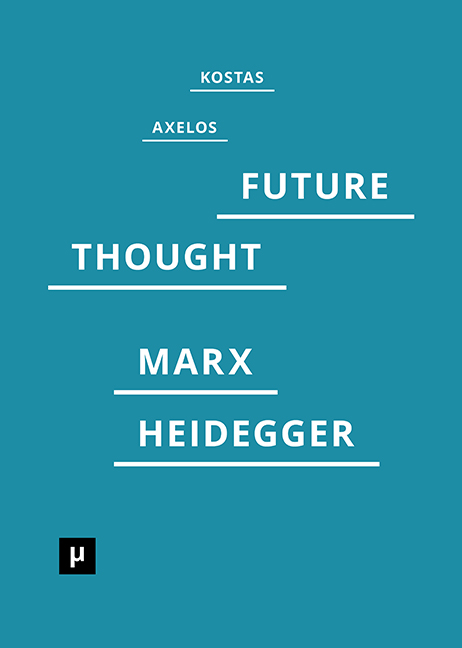Kostas Axelos: Introduction to a Future Way of Thought: On Marx and Heidegger (1966/2015)
Filed under book | Tags: · earth, labour, philosophy, philosophy of technology, production, technology

“‘Technologists only change the world in various ways in generalized indifference; the point is to think the world and interpret the changes in its unfathomability, to perceive and experience the difference binding being to the nothing.’
Anticipating the age of planetary technology Kostas Axelos, a Greek-French philosopher, approaches the technological question in this book, first published in 1966, by connecting the thought of Karl Marx and Martin Heidegger. Marx famously declared that philosophers had only interpreted the world, but the point was to change it. Heidegger on his part stressed that our modern malaise was due to the forgetting of being, for which he thought technological questions were central. Following from his study of Marx as a thinker of technology, and foreseeing debates about globalization, Axelos recognizes that technology now determines the world. Providing an introduction to some of his major themes, including the play of the world, Axelos asks if planetary technology requires a new, a future way of thought which in itself is planetary.”
First published as Einführung in ein künftiges Denken: Über Marx und Heidegger, Niemeyer, Tübingen, 1966.
Edited and with an Introduction by Stuart Elden
Translated by Kenneth Mills
Publisher meson press, Lüneburg, June 2015
Creative Commons BY-NC-ND 4.0 License
ISBN 9783957960061
178 pages
Review: George Tomlinson (Marx & Philosophy 2016).
Comment (1)François Laplantine: The Life of the Senses: Introduction to a Modal Anthropology (2005/2015)
Filed under book | Tags: · anthropology, body, cinema, ethnography, film, image, knowledge, language, life, movement, philology, philosophy, rhythm, sensation, sensory ethnography

“Both a vital theoretical work and a fine illustration of the principles and practice of sensory ethnography, this much anticipated translation is destined to figure as a major catalyst in the expanding field of sensory studies.
Drawing on his own fieldwork in Brazil and Japan and a wide range of philosophical, literary and cinematic sources, the author outlines his vision for a ‘modal anthropology’. François Laplantine challenges the primacy accorded to ‘sign’ and ‘structure’ in conventional social science research, and redirects attention to the tonalities and rhythmic intensities of different ways of living. Arguing that meaning, sensation and sociality cannot be considered separately, he calls for a ‘politics of the sensible’ and a complete reorientation of our habitual ways of understanding reality.”
First published as Le social et le sensible: introduction à une anthropologie modale, Téraèdre, Paris, 2005.
Translated by Jamie Furniss
With an Introduction by David Howes
Publisher Bloomsbury, London, 2015
Sensory Studies series, 1
ISBN 1472534808, 9781472534804
xviii+152 pages
Reviews: Claude Rivière (Recherches sociologiques et anthropologiques, 2006, FR), Fabien Pernet (Anthropologie et sociétés, 2006, FR), Georges Bertin (Esprit critique, 2009, FR).
PDF (updated on 2016-8-20)
More on François Laplantine and sensory ethnography.
Comment (0)Erich Hörl: The Technological Condition (2011/2015)
Filed under paper | Tags: · cybernetics, ecology, philosophy, philosophy of technology, subjectivity, technics, technology, work
Partial translation of the introduction to Die technologische Bedingung. Beiträge zur Beschreibung der technischen Welt, ed. Hörl (Suhrkamp 2011), a book “seeking to reformulate the (media)technical question under neocybernetic conditions at the beginning of twenty-first century. As such, it is part of a three-volume project. It follows Die Transformation des Humanen. Beiträge zur Kulturgeschichte der Kybernetik, eds. Michael Hagner and Erich Hörl (Suhrkamp 2008), and it will be followed soon by On General Ecology. The New Ecological Paradigm in the Neocybernetic Era, ed. Hörl.”
Translated by Anthony Enns
Published in Parrhesia 22, 2015, pp 1-15
Open access
More from Erich Hörl, and on philosophy of technology and media ecology.
Comment (0)
